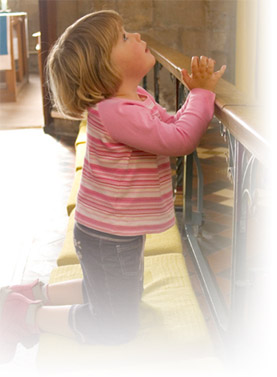Sunday Sermon for June 26, 2011, Corpus Christi, Year A
Readings: Dt 8:2-3, 14b-16a; 1Cor 10:16-17; Jn 6:51-58
In these past two weeks we have been given the two feasts which, perhaps, most define us as Catholics. Last week we celebrated our faith in the Holy Trinity and the truth that there is only one God Who is three Persons. Today we celebrate the greatest gift that has been given to humanity since life began: the Most Holy Eucharist. In this Gift our Lord is truly present sacramentally and substantially in such a way that we can receive Him into our own being.
The truth that our Lord loves us so much that He gives us Himself, Body, Blood, Soul and Divinity, His whole Person, is unfathomable. Because we cannot understand the gift and, perhaps more to the point, because we cannot understand the love, we tend to pull back from the Gift Who is also the Giver.
The Eucharist is infinite because the Eucharist is God Himself. Our finite minds have enough difficulty accepting this truth, but the bigger problem is our willfully finite hearts. There is no limit to our capacity to grow in love, but so often we close our hearts, even to God. Once the heart is closed, then we begin rationalizing with our minds to convince ourselves that such love is simply not possible, this is something the Church made up in the Middle Ages, it is merely symbolic, and so many other denials of Jesus and His love for us.
The fact is that the Eucharist is a mystery that will never be fully comprehended in this life or in the next. The depths of the love of Jesus in the Eucharist will never be plumbed. This is not because the Eucharist is not real; it is because the Eucharist is God. Think about it for a moment, we cannot fully comprehend our own self, let alone another human person. When you truly love someone, your love keeps growing deeper and you never reach the end of your ability to love that person more. This is true on the human level; it is infinitely more so on the divine level.
People want scientific proof for things that require faith. It is funny that we do not require scientific proof from a person we would like to marry when they tell us about things that have happened in their life. We do not require scientific proof when that same person says “I love you.” We cannot prove these things scientifically; we must take a person’s word for it.
It is, of course, reasonable to keep one’s eyes and ears open to make sure that the actions of the person correspond to the words. In the case of the Eucharist, it is Jesus, God Himself, Who speaks the words. He has demonstrated that He is true; He has proven His love.
God has shown Himself faithful. In the first reading we hear about the manna that the people ate for forty years in the desert and water which came forth from a rock. These gifts from God provided food and drink to over one million people every day. If God can provide bread to keep the bodies of His people alive, does it not make even more sense that He would give us something to keep our souls living and burning with love?
St. Paul, in the second reading, reiterates the faith of the Early Christians in the Real Presence of Jesus in the Eucharist. He makes it clear that our participation in the Eucharist, is a participation in the Body and Blood of Jesus. Our Lord Himself told us in the Gospel that unless we eat His Flesh and drink His Blood, we have no life within us. However, He says, if we eat His Body and drink His Blood, we have life eternal.
What this tells us is that the Eucharist is not something natural. Nothing natural could have a supernatural effect, such as eternal life. So the Eucharist is supernatural, as are its effects in our souls. Therefore, this profound Gift cannot be comprehended by the natural mind and will. Only with the supernatural help of the Trinity dwelling within us can we begin to discern the Gift and the Giver.
The first reading tells us of God fidelity to the people of Israel in the desert, but it also reminds us that the people refused to believe God. Even in their hardness of heart God continued to give freely, as He does with us. Regarding the Eucharist, God asks from us faith, hope and charity. He wants us to believe in His words and in His presence among us in the Blessed Sacrament. He wants us to hope for eternal life which is promised in Eucharist. He wants us to love Him and accept His love as He gives Himself to us in Holy Communion.
Fr. Altier’s column appears regularly in The Wanderer, a national Catholic weekly published in St. Paul, Minn. For information about subscribing to The Wanderer, please visit www.thewandererpress.com.

